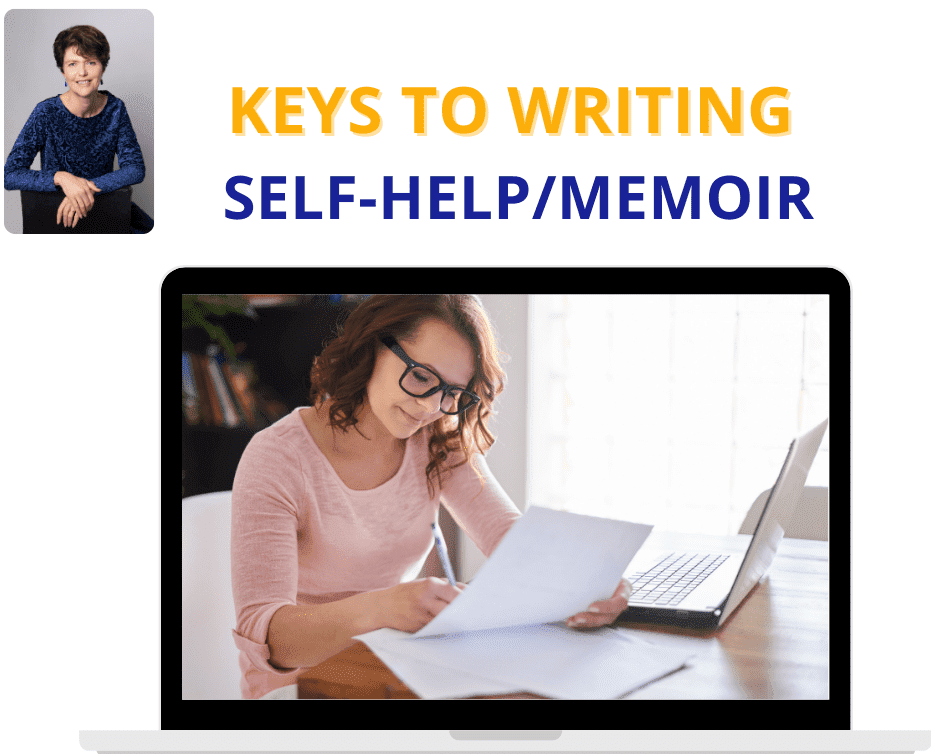What are some of the keys to writing a self-help memoir book? First, what is this mongrel book genre?
What is a memoir? It is a snapshot taken from your life that’s compelling and has a strong message.
What is self-help? Also called personal development, the self-help genre is diverse. It’s founded on the principle of the reader taking control of their lives, solving problems by learning new principles, tips and techniques. It often uses the direct voice (you, I, we).
If your book’s topic is just stories (not your own), it may or may not be self-help. See The Success Principles. It is a bunch of inspiring stories but couched in the topic of being successful, so it is self-development.
Some Things to Avoid when Writing Self-Help with Your Stories in It
Stay away from using platitudes and quotes that everyone’s heard a million times.
Don’t dive into miles of your personal background that isn’t related to the topic (this is not meant to be a catharsis for you).
Don’t try to put the self help at the start and the memoir at the end. It’s better to merge the two and call it self-help.
Don’t go too broad in your topic. Broad interests no-one; but catering to a specific problem for a specific market will resonate with a set of people.
Some Things to Focus on when Writing Self-Help
You need a really in-depth knowledge of your reader. What is the typical reader’s age, various locations, and gender?
Then think about the reader’s motivation for looking at your book. Are they frustrated they can’t get any sales? Curious that the title triggered them? Or perhaps they want to achieve more confidence?
Researching readers’ problems
Places like Quora’s battleground of hot topics, forums like Reddit and Facebook groups are ideal fodder for book research. Remember to note down anything people say or questions about the topic, especially ones that repeatedly come up. They all have different viewpoints to you, and some may want to find out how to unlock problems you didn’t even realise existed.
Remember also that problems have a hierarchy! Many people are still stuck in the bottom, with survival, job security, bills, etc. Others have this and community/friendships and so seek more confidence, self-esteem, better relationships. Some are lack focused, while others try their best to be abundance focused. Some are just discovering the amazingness of self-direction and positivity, so these are the ones who are ready for a self-help and memoir style book.
Could your book start a movement?
Another thing to think about is: what starts a movement?
Hal Enrod started a movement and community with his book, The Miracle Morning, now with at least eight books. While the habits are nothing new, it really spawned something because of the revelations of others he infected with the morning ‘bug’.
Think about new terms you could coin or a way to draw together a string of ideas into a clever umbrella concept. Scott Pape has his ‘mojo money’ and his three buckets.
Start with an Outline
Step 1: Get your topic straight.
Write a preface and/or an introduction to the self-help book. Explain how you discovered this topic and why you’re qualified to write the book.
Did frustration for others or for yourself drive you to write it? Definitely put about this. Very often, we’ve gone through some years ago what others are going through now. It seems so easy now, but we have to take ourselves back to the early days to empathise with our reader.
Step 2: Outline each chapter.
In Chapter 1, explain the problem or use a story to illustrate the magnitude of its pain. Use this as your chance to connect with the reader through empathy.
In Chapter 2, introduce the solution. Explain how you came to this solution and give reasons why it’s effective.
In Chapter 3 and subsequent chapters, many writers give a step-by-step solution. Other authors just let the reader learn as a cumulative effect.
Most start with 10 chapters as a minimum guideline, although there are many different structures.
At the end, you’ll want to tie your concepts together, end with a positive statement and give some encouragement for the reader to start taking actions right away. Certainly, it is very easy to start a book and not do anything with it, so asking them to get the pen and paper out to make a list is quite alright.
If all this becomes too overwhelming, please book in a 20-minute discovery call to find out if Jennifer is the book writer coach for you. She also edits self-help and how-to books.
Schedule Appointment
